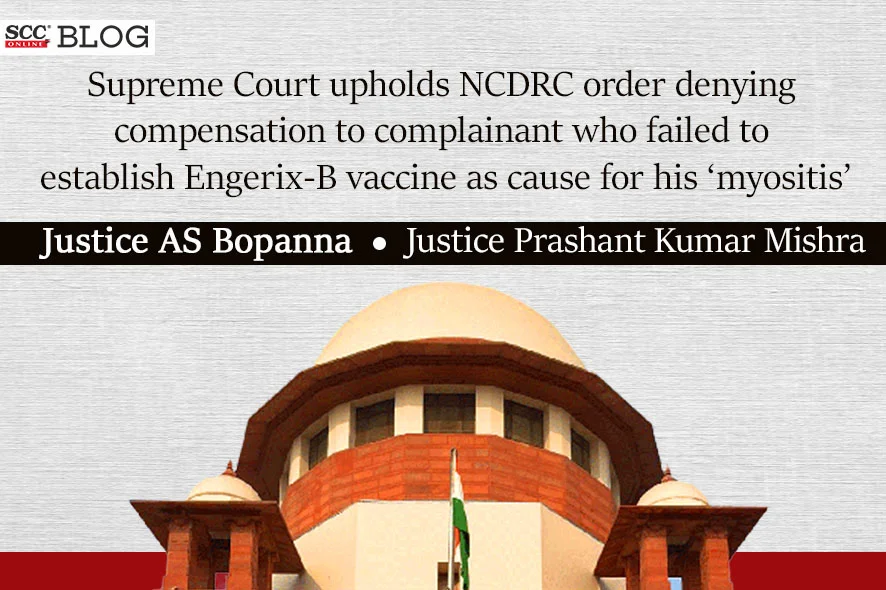Supreme Court: In an appeal against the order dated 25-04-2012 passed by the National Consumer Disputes Redressal Commission, (‘NCDRC’), wherein the Commission has held that the complainant has miserably failed to establish his case in regard to either any defect in the drug in question or any negligence amounting to deficiency in service on the part of the manufacturer of the drug (Glaxo Smithkline Pharmaceuticals), the division bench of AS Bopanna* and Prashant Kumar Mishra, JJ. while upholding the impugned order, held that the appellant has not established with the minimal required evidence to conclude even on preponderance of probability that the cause for his ‘myositis’ was the Engerix-B vaccine. Further, the appellant did not furnish the muscle biopsy required by Glaxo Smithkline Pharmaceutical, to enable them to take an ultimate decision in the matter. Thus, the appellant cannot complain that the respondents have not attempted to redress his grievance.
Background:
The appellant to achieve immunity against contracting Hepatitis B, on 10-08-1998 approached his family physician for administering the repeat dose of the vaccine Engerix-B, along with his family members. The family members of the appellant had no adverse reaction to the said drug but, after four days of being vaccinated, the appellant felt severe pain in his left shoulder at the site of the injection and he suffered pain while moving his shoulder. It was noticed that the skin at the place where he was injected was found shiny with a bit of erythema with local tenderness. The appellant contended that he developed sudden permanent disability in his shoulder which according to him was caused due to adverse reaction of the vaccine Engerix-B manufactured by Glaxo Smithkline Pharmaceuticals.
In the process since the appellant learnt that the pain being suffered by the appellant was due to ‘myositis’ which is a condition occurring as an adverse reaction due to the administration of Engerix-B, he again contacted the respondents. Since the response of the respondents was not satisfactory and according to the appellant since the same amounted to deficiency due to negligence which had also caused suffering to him, he filed a complaint before the NCDRC claiming compensation of Rs,90,20,557/-.
Issues:
Whether there is sufficient evidence to establish that the appellant in fact had suffered ‘myositis’ and if so whether the cause for same was the vaccination Engerix-B being administered to the appellant?
After taking note of affidavit filed by the doctor the Court said that it would indicate that the doctor has stated only about administering the vaccine and the fact of the shoulder pain being reported to him subsequently. The advice he gave in that regard and the medication prescribed is also stated. He thereafter stated the names of the doctors to whom he had referred the appellant for further treatment. Further, the Court noted that neither the affidavit of the doctors who had subsequently treated the appellant with specific reference to the shoulder pain has been filed nor has the said doctor who has filed the affidavit that the vaccination was the cause due to which the appellant had suffered ‘myositis’ and had led to the disablement in the nature.
Therefore, the Court said that though the affidavit of doctors had been filed in the instant case, they are not of any evidentiary value and an affidavit of such nature did not warrant any cross-examination as the affidavit on the face of it had not indicated anything to establish the case of the appellant. The doctors, except vaguely stating about the incident have not authentically provided any details based on their medical expertise or on their research on the subject from medical literature or commentaries about the adverse reaction of the vaccine in question nor have they brought on record any authentic material.
The Court opined that the initial burden to be discharged by the appellant has not been discharged to substantiate the allegation which was made in the complaint. The burden was on the appellant more particularly in a circumstance when all the family members had got administered the same vaccination from the same source and the appellant himself did not undergo any difficulty when the first two doses were administered.
Whether even if ‘myositis’ being a minimal cause is accepted, the non-mentioning of the same as an ‘adverse reaction’ in the literature or ‘vial’, if could be considered as ‘deficiency of service’?
The Court noted that the affidavit filed on behalf of Glaxo Smithkline Pharmaceutical would indicate the detailed procedure that is followed for certification of the drug. It is only after such certification that the drug is available in the market. Nothing has been placed on record to indicate that this is a drug which was available ‘of the shelf’, without prescription.
The Court viewed that the said family doctor also owed a duty to his patient and if he has prescribed a drug, it was incumbent on him to know more details about the vaccination before prescribing or administering the same. Further, if the same drug was administered to all the family members and after the third dose was administered to the appellant, he had suffered the discomfort complained of, it would also raise a question as to whether it had been administered in the manner where it ought to be administered. Thus, as per the Court the allegations made by the appellant would also make the said family doctor responsible and ideally, he ought to have been a party respondent to the proceedings rather than filing his affidavit.
Therefore, the Court upheld the impugned order.
[Prakash Bang v Glaxo Smithkline Pharmaceuticals Ltd, 2023 SCC OnLine SC 1123, decided on 05-09-2023]
*Judgment Authored by: Justice A.S. Bopanna






